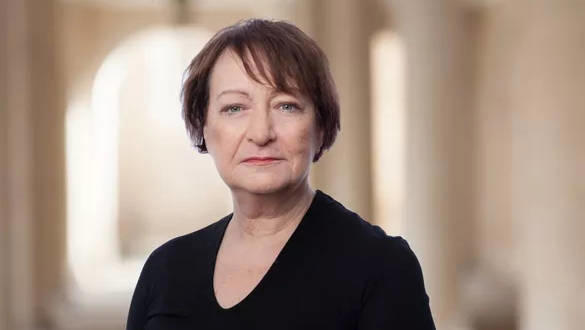Neeta Major’s late father was a doctor who came to the UK from India in the 1960s. She says the BMA helped him to feel as if he belonged.
‘This organisation was there for my dad to help him through some challenging times. He would love to know I was here.’
Rachel Podolak came for a part-time job, became interested in the politics, and worked in a wide range of areas such as marketing, the branch-of-practice committees and the international department, before a spell elsewhere and returning as national director of BMA Cymru Wales.
‘If you come here, it is very hard not to become totally passionate and committed to the broader cause,’ she says.
Bases covered
The two new co-chief executive officers of the BMA have a strong personal affinity for the members they serve.
Ms Major and Ms Podolak were appointed in May, replacing Tom Grinyer. They are the first people to share the job ever, and have also kept their previous roles (Ms Major’s being group chief finance officer and Ms Podolak as national director BMA Cymru Wales) with some backfilling from colleagues.
 Tom Grinyer
Tom Grinyer
They say the role splits fairly easily – with Ms Major doing the corporate side and Ms Podolak the political. And it has an obvious advantage.
Having two minds in the room is always better than having oneMs Major
‘I’ve been on boards for several years before joining the BMA and board positions can be quite lonely,’ says Ms Major. ‘The wonderful thing about doing this kind of job share is that you can really brainstorm, because having two minds in the room is always better than having one.’
So what are their priorities? Putting it simply, they are about ensuring the BMA can meet members’ needs. Take, for example, the policy, decided at the association’s recent annual representative meeting, to restore pay to 2008 real-terms value in five years.
Ms Podolak has experience of BMA pay negotiations with the UK and Welsh governments, and while she won’t be personally at the table for these talks, she and Ms Major see themselves as having a great deal of influence and responsibility in helping the initiative succeed.
Member engagement
The starting point, says Ms Podolak, is to recognise that ‘if you’re arguing for a legitimate ask, you feel strength’. The next is to ensure the expertise of the elected members and the staff is brought effectively together. As she puts it, ‘we need to harness the unity behind that ask, and the strength of the organisation as a whole’.
She says, if there is going to be industrial action, members need to be engaged, and involved in the common cause. And, of course, the rest of the organisation still needs to function, helping members individually and campaigning for change. She says the chief executives’ priorities are to set an effective overall strategy and maintain a positive, inclusive culture.
The campaign for fair pay unites the profession, but it is not easy to generalise about everything that a typical doctor or medical student needs – mainly because there is no such thing as a typical one. Members’ needs change, and the BMA seeks to meet them at every stage. To Ms Major, this is a particular selling point of the organisation, and a great source of attraction for members and staff alike.
What we really want is that people don’t get to the stage of needing our wellbeing services’Ms Podolak
She says: ‘What is compelling about joining is this is a unique association that offers to look after you from student to retirement. It can offer you support at every point of your career journey.’ She gives a few examples – employment representation, the collective negotiation of contracts, rota checking, the library, wellbeing services.
The latter has seen a substantial increase in use during the pandemic. Ms Podolak is proud the BMA provides them, and that they consistently get good feedback from members, but she also wants the BMA to work for a health service that makes them less necessary. One that has the investment, that gets the basics right in areas such as rotas, that recruits enough staff, that plans its workforce properly, that tackles soaring student debt.
‘What we really want is that people don’t get to the stage of needing our wellbeing services but unfortunately they do, and hence we provide them.’
Experience matters
Another priority will be to make progress in implementing the changes that make the BMA a more inclusive and representative organisation. Ms Major says, since the Romney report into sexism in 2019, there have been a lot of positive developments, such as a speak-up guardian and the network of elected women.
There has been an independent review which ‘said you’re about half-way – you’ve got another 20 per cent that are in progress, but you’ve got a way to go’.
 Daphne Romney QC
Daphne Romney QC
The co-CEOs are determined to work their way through the recommendations, but just as important in improving the numbers side of representation on committees is monitoring the experiences that members have.
‘We don’t want it just to be a tick-box exercise,’ says Ms Major.
What’s undeniable is that the two are setting an example by their own working arrangements. Ms Podolak says: ‘The biggest surprise is how quickly we have had enquiries from members, asking how do you job share, we’re thinking about standing, is that a possibility for elected members?’
The answer is a resounding yes.
As Ms Podolak says: ‘We said when we applied for this role, we were keen to show that the BMA had really modernised, and was open to the best people for the roles, regardless of background.’

